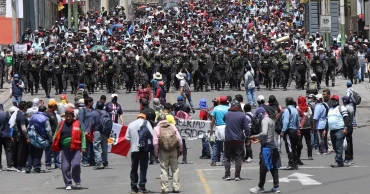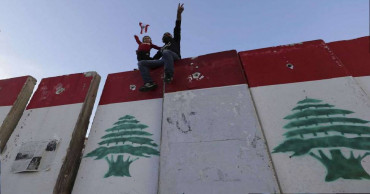anti-government protest
13 killed in Peru clashes amid new anti-government protests
At least 13 people died Monday in southeast Peru as protests seeking immediate elections resumed in neglected rural areas of the country still loyal to ousted President Pedro Castillo.
Peru's top human rights agency called for an investigation into the deaths, 12 of which took place amid clashes between security forces and protesters attempting to seize control of an airport in the city of Juliaca, near the border with Bolivia.
It was the highest death toll since the unrest began in early December following Castillo's removal and arrest following a widely condemned attempt to dissolve Congress and head off his own impeachment. Among the 12 killed in Juliaca was a 17-year old, according to news reports. A 13th person died in the nearby city of Chucuito, where protesters blocked a highway.
Castillo's successor, his former running mate Dina Boluarte, has supported a plan to push up to 2024 elections for president and congress originally scheduled for 2026. She's also expressed support for judicial investigations into whether security forces acted with excessive force.
But such moves have so far failed to quell the unrest, which after a short respite around the Christmas and New Year's holidays have resumed with force in some of Peru's poorest areas, where support for Castillo's unorthodox rule had been strongest.
Nationwide, protests were reported in about 13% of Peru's provinces on Monday, many of them consisting of roadblocks making it impossible for truckers to deliver produce to market.
With Monday's casualties, the number of people killed in clashes with security forces climbed to 34. Hundreds more have been treated for injuries.
Boluarte's government has accused former Bolivian President Evo Morales of fueling the unrest. On Monday, officials issued an order blocking the influential leftist leader from entering the country on national security grounds. Authorities said eight allies of Morales — who were also banned — recently traveled to Peru to coordinate protest activity in the border region separating the two countries.
Castillo, a political novice who lived in a two-story adobe home in the Andean highlands before moving to the presidential palace, eked out a narrow victory in elections last year that rocked Peru’s political establishment and laid bare the deep divisions between residents of the vibrant capital, Lima, and the long-neglected countryside.
3 years ago
US sanctions on RAB made BNP fearless in anti-government protests: Fakhrul
The US sanctions on RAB and the international community’s voice against human rights violations in Bangladesh have helped rejuvenate the BNP rank and file to take to the streets fearlessly, as reflected in its recent rallies, according to the opposition party’s secretary general Mirza Fakhrul Islam Alamgir.
He also said that the law enforcement forces are not as aggressive towards the BNP's programs as they were in the past because it is a universal practice that civil and military bureaucrats do not stand against the people when they put up resistance with just demands.
In an interview with UNB this week, Fakhrul talked about many other issues, including BNP’s plans for the simultaneous movement, the Dhaka rally on December 10, the Election Commission, the next general election, the proposed national government, and its relations with Jamaat and India. This is the first part of the interview.
Read more: Huge crowds in BNP rally mean they want democracy back, says Mirza Fakhrul
“When the government was continuing all misdeeds at an unstoppable pace without facing any resistance and a loud voice from inside and outside the country, the US sanctions on RAB naturally instilled new hope in the democracy-loving people of Bangladesh. It has also inspired BNP,” he said.
The BNP leader also said their party leaders and activists got a message through the sanctions that the democracy-loving international community would no longer accept such activities, especially the incidents of human rights violations.
“The US in its reports was voicing concerns over Bangladesh’s human rights situation for several years. But this time they not only raised their voices against human rights violations, but also they acted (through the sanctions). It’s undoubtedly encouraged us greatly. On the other hand, the visit of UN High Commissioner for Human Rights Michele Bachelet to Bangladesh and her subsequent statements on the issue definitely inspired us,” he observed.
Read more: BNP MPs ready to resign; Govt must go for credible election: Fakhrul
3 years ago
Heavy security in Beirut as parliament convenes on budget
Lebanese security forces scuffled Monday with protesters near the parliament building in downtown Beirut, where lawmakers are scheduled to begin a two-day discussion and later approval of the state budget amid a crippling financial crisis.
6 years ago





